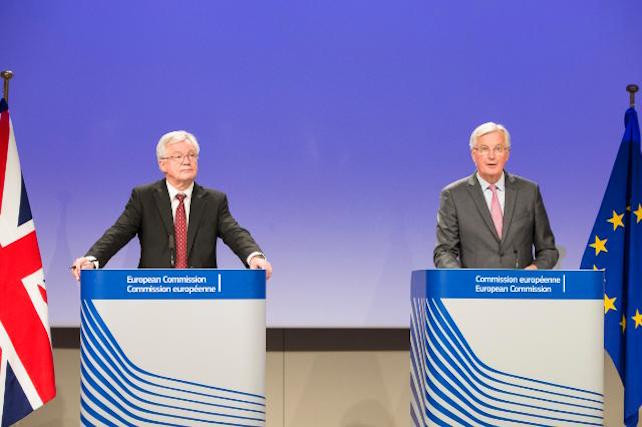Barnier said that, in order to brief the member states and the European Parliament on the negotiations, he would need some time, and therefore the UK had two weeks to come up with new and imaginative solutions.
On Friday 10 November, after just two days of negotiations, the tone seemed to harden on both sides, which may lead to higher level political discussions.
“We don’t ask the UK for concessions and we don’t intend to make concessions. We work with facts with a legal basis, which were based on reciprocal and detailed engagements.”
He added that “we want legal certainty where Brexit creates uncertainty.”
David Davis, the British secretary of state, said that the discussions had narrowed down to a few important issues, and that “now is the time for both sides to move together to seek solutions. This is a serious business.”
He added that it was necessary to move into the “political discussions”, and pressed on moving towards discussing the future relationship. Davis said that “both parties need to build confidence in both the process and indeed in the shared outcome” and that “flexibility, imagination and willingness to make progress” was needed from both sides.
Citizen’s rights
While Barnier welcomed the progress made on the administrative procedure to apply for settled status in the UK, he reiterated that it should be simple and low cost. “The UK provided useful clarifications” with the latest technical paper, and there were “good discussions” on direct effect.
More work was needed on family reunification, the right to export social benefits and ECJ jurisdiction.
Davis stated that: “we are willing to consider what further reassurance we can give to existing families--even if they are not currently living together in the UK,” which may become an important concession to the EU’s demands.
On the other hand, Davis regretted that not enough progress had been made from the EU’s side on the mutual recognition of professional qualifications. The British government wanted to “protect their livelihoods in line with our broader approach that people should be able to continue living their lives as they do now.”
He regretted that the rights to vote in local elections were not yet included in the withdrawal agreement, but that the UK would discuss this bilaterally with member states if it was not included.
On incorporating citizens’ rights into UK law, Davis said that “over time, our courts can take account of the rulings of the European Court of Justice in this area, to help ensure consistent interpretation.” However, he insisted that “it remains a key priority for the United Kingdom, as we leave the European Union, to preserve the sovereignty of its courts.”
Ireland border
On the tricky situation of the future border between Ireland and Northern Ireland, there seems to have been little progress.
Barnier talked about the need to work on a common reading of the implications of Brexit on the Good Friday Agreement and the Common Travel Area.
Meanwhile, Davis said that the British government respected
“the European Union desire to protect the legal order of the single market and Customs Union. But that cannot come at cost to the constitutional and economic integrity of the United Kingdom. This cannot amount to creating a new border inside our United Kingdom.”
He added that: “We will only be able to conclude them finally in the context of the future relationship.”
Financial settlement
On the financial settlement, it seems that the decisions will be taken at the highest political levels at the European Council in December. Barnier insisted that it was only about settling the accounts, and that it was about a “precise translation of the commitments made by the British prime minister in the Florence speech.” This question was crucial before moving to the second phase.
Davis stated that:
“Our European partners will not need to pay more or receive less over the remainder of the current budget plan as a result of our decision to leave. The UK will honour the commitments we have made during the period of our membership. We are making clear progress in building a common technical understanding on every item.”
